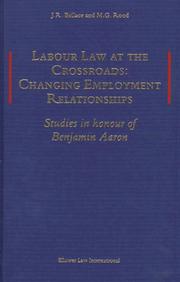| Listing 1 - 10 of 23 | << page >> |
Sort by
|
Book
ISBN: 0262377349 0262377357 Year: 2024 Publisher: Cambridge, Massachusetts : The MIT Press,
Abstract | Keywords | Export | Availability | Bookmark
 Loading...
Loading...Choose an application
- Reference Manager
- EndNote
- RefWorks (Direct export to RefWorks)
"A review of labor law exploring the decline of union power and demonstrating how collective bargaining can continue to support worker power and improve economic outcomes for workers and communities despite macro shifts in the US economy over the past 40 years"--
Book

ISBN: 9781780682211 1780682212 Year: 2014 Volume: *2 Publisher: Cambridge Intersentia
Abstract | Keywords | Export | Availability | Bookmark
 Loading...
Loading...Choose an application
- Reference Manager
- EndNote
- RefWorks (Direct export to RefWorks)
Social law. Labour law --- Arbeidsrecht --- Arbeidswetgeving --- Droit du travail --- Labor laws and legislation --- Law [Industrial ] --- Law [Labor ] --- Legislation du travail --- Competition, Unfair --- Travail --- Concurrence déloyale --- Droit --- Concurrence --- Concurrence déloyale --- Droit du travail. --- Droit. --- Etats-Unis --- Allemagne --- Belgique
Book
ISBN: 0262373351 026237336X 0262545136 Year: 2023 Publisher: Cambridge, Massachusetts : The MIT Press,
Abstract | Keywords | Export | Availability | Bookmark
 Loading...
Loading...Choose an application
- Reference Manager
- EndNote
- RefWorks (Direct export to RefWorks)
"An exploration of how labor law has protected companies' rights to surveil their employees and limit worker power, and how it might be reformed"--
Labor laws and legislation --- Employees --- Effect of technological innovations on --- Laborers --- Personnel --- Workers --- Persons --- Industrial relations --- Personnel management --- LAW / Labor & Employment --- BUSINESS & ECONOMICS / Labor / General --- POLITICAL SCIENCE / Privacy & Surveillance (see also SOCIAL SCIENCE / Privacy & Surveillance)
Book
ISBN: 1978817983 1978818009 Year: 2022 Publisher: New Brunswick, NJ : Rutgers University Press,
Abstract | Keywords | Export | Availability | Bookmark
 Loading...
Loading...Choose an application
- Reference Manager
- EndNote
- RefWorks (Direct export to RefWorks)
"This book is about the convergence of trends in two American institutions - the economy and the criminal justice system. The American economy has radically transformed in the past half-century, led by advances in automation technology that have permanently altered labor market dynamics. Over the same period, the U.S. criminal justice system experienced an unprecedented expansion at great cost. hese costs include not only the $80 billion annually in direct expenditures on criminal justice, but also the devastating impacts experienced by justice-involved individuals, families, and communities. Recently, a widespread consensus has emerged that the era of "mass incarceration" is at an end, reflected in a declining prison population. Criminal justice reforms such as diversion and problem-solving courts, a renewed focus on reentry, and drug policy reform have as their goal keeping more individuals with justice system involvement out of prisons, in the community and subsequently in the labor force, which lacks the capacity to accommodate these additional would-be workers. This poses significant problems for criminal justice practice, which relies heavily on employment as a signal of offenders' intentions to live a law-abiding lifestyle. The diminished capacity of the economy to utilize the labor of all who have historically been expected to work presents significant challenges for American society. Work, in the American ethos is the marker of success, masculinity and how one "contributes to society." What are the consequences of ignoring these converging structural trends? This book examines these potential consequences, the meaning of work in American society, and suggests alternative redistributive and policy solutions to avert the collision course of these economic and criminal justice policy trends"--
Criminal justice, Administration of --- Labor supply --- United States --- Economic conditions. --- economic change, criminal justice reform, law, labor studies, sociology, public policy, political science, automation technology, market dynamics, mass incarceration, drug policy, masculinity, criminology, recidivism.
Book
ISBN: 9789046535998 Year: 2011 Volume: 2011/2 Publisher: Mechelen Kluwer
Abstract | Keywords | Export | Availability | Bookmark
 Loading...
Loading...Choose an application
- Reference Manager
- EndNote
- RefWorks (Direct export to RefWorks)
Wages --- Personnel management --- Social law. Labour law --- Arbeidsrecht --- Arbeidswetgeving --- Droit du travail --- Labor laws and legislation --- Law [Industrial ] --- Law [Labor ] --- Legislation du travail --- Lonen --- Arbeidsovereenkomsten --- wetgeving --- 331.2 --- 331.211 --- loon - salaris --- loonbetaling, wijze - dienstencheques - ecocheques --- Lonen. --- wetgeving. --- Wetgeving. --- Labor contract --- Belgium
Book
ISBN: 9789004148833 9789004231467 9004231463 9781280876196 1280876190 9004148833 9786613717504 6613717509 Year: 2012 Publisher: Leiden Nijhoff
Abstract | Keywords | Export | Availability | Bookmark
 Loading...
Loading...Choose an application
- Reference Manager
- EndNote
- RefWorks (Direct export to RefWorks)
This volume constitutes a commentary on Article 32 of the United Nations Convention on the Rights of the Child. It is part of the series, A Commentary on the United Nations Convention on the Rights of the Child , which provides an article by article analysis of all substantive, organizational and procedural provisions of the CRC and its two Optional Protocols. For every article, a comparison with related human rights provisions is made, followed by an in-depth exploration of the nature and scope of State obligations deriving from that article. The series constitutes an essential tool for actors in the field of children’s rights, including academics, students, judges, grassroots workers, governmental, non- governmental and international officers. The series is sponsored by the Belgian Federal Science Policy Office .
Human rights --- Family law. Inheritance law --- Social law. Labour law --- Child labor --- Children (International law). --- Law and legislation. --- Convention on the Rights of the Child --- Children (International law) --- International law --- Children --- Labor laws and legislation --- Law and legislation --- Legal status, laws, etc. --- LAW / Labor & Employment. --- Convention relative aux droits de l'enfant (1989) --- Enfants --- Travail --- Droit --- Droits
Book
ISBN: 9789046554326 Year: 2013 Volume: *5 Publisher: Mechelen Kluwer
Abstract | Keywords | Export | Availability | Bookmark
 Loading...
Loading...Choose an application
- Reference Manager
- EndNote
- RefWorks (Direct export to RefWorks)
Hygiene. Public health. Protection --- Sociology of work --- Social law. Labour law --- Arbeidsrecht --- Arbeidswetgeving --- Droit du travail --- Labor laws and legislation --- Law [Industrial ] --- Law [Labor ] --- Legislation du travail --- bescherming op het werk --- 331.4 --- protection au travail --- Arbeidsmilieu. Arbeidsomgeving. Werkmilieu. Arbeidsomstandigheden --- 331.4 Arbeidsmilieu. Arbeidsomgeving. Werkmilieu. Arbeidsomstandigheden --- Industrial safety --- Equipment and supplies --- Belgium --- Sociology --- Vocational guidance
Book
ISBN: 9780197771747 0197771742 0197771769 Year: 2024 Publisher: New York, NY : Oxford University Press,
Abstract | Keywords | Export | Availability | Bookmark
 Loading...
Loading...Choose an application
- Reference Manager
- EndNote
- RefWorks (Direct export to RefWorks)
"In early 2018, the text of an employment contract surfaced on Twitter. Munger Tolles & Olson, a prominent Los Angeles law firm, required its summer associates to sign a contract that contained a binding arbitration clause. In and of itself, this was not unusual; binding arbitration clauses are ubiquitous in today's employment contracts. They require employees to submit all employment related grievances to a private, binding system of arbitration and to forfeit their access to the legal system. But this contract was unusually explicit in spelling out the true enormity of what it required new associates to give up. In addition to explaining that, by agreeing to arbitrate, "you are giving up your right to a jury trial," it specified that employment-related claims would include, "without limitation," all "federal, state and local statutory, constitutional, and contractual and/or common law claims." The contract went on to highlight a few examples, such as all claims arising under Title VII of the Civil Rights Act of 1964, the Age Discrimination in Employment Act, the Equal Pay Act, the Fair Labor Standards Act, and the Americans with Disabilities Act, as well as a variety of similar state laws. Combined with a non-disclosure requirement, the clause all but ensured that any arbitration proceedings would be kept private, no matter how grave the injury or how unsatisfactory the dispute resolution process"--
Arbitration and award --- Arbitration agreements, Commercial --- Labor laws and legislation --- Collective bargaining --- Consumer protection --- arbitration, litigation, employment law, commercial law, securities law, labor law, consumer rights, American political development, political economy, institutional change --- Law and legislation --- United States --- Politics and government.

ISBN: 904110366X Year: 1997 Publisher: The Hague Kluwer Law International
Abstract | Keywords | Export | Availability | Bookmark
 Loading...
Loading...Choose an application
- Reference Manager
- EndNote
- RefWorks (Direct export to RefWorks)
Social law. Labour law --- Arbeidsrecht --- Arbeidswetgeving --- Association capital-travail --- Capital and labor --- Capital-travail --- Droit du travail --- Employee-employer relations --- Employer-employee relations --- Industrial relations --- Industriële relaties --- Labor and capital --- Labor laws and legislation --- Labor relations --- Labor-management relations --- Law [Industrial ] --- Law [Labor ] --- Legislation du travail --- Relations de travail --- Relations du travail --- Relations employeurs-employés --- Relations employés-employeurs --- Relations humaines dans les entreprises --- Relations industrielles --- Relations ouvrières --- Relations patronales-ouvrières --- Travail-capital --- Travail --- Droit --- Industrial relations. --- Labor laws and legislation.

ISBN: 9041113703 Year: 2000 Volume: 38 Publisher: The Hague Kluwer Law International
Abstract | Keywords | Export | Availability | Bookmark
 Loading...
Loading...Choose an application
- Reference Manager
- EndNote
- RefWorks (Direct export to RefWorks)
Social law. Labour law --- Arbeidsrecht --- Arbeidswetgeving --- Deregulation --- Deregulering --- Droit du travail --- Déréglementation --- Dérégulation --- Industry--Deregulation --- Labor laws and legislation --- Law [Industrial ] --- Law [Labor ] --- Legislation du travail --- Libéralisation --- 351.83 --- Labour laws and legislation, International --- Employees --- Employment law --- Industrial relations --- Labor law --- Labor standards (Labor law) --- Work --- Working class --- Industrial laws and legislation --- Social legislation --- Arbeidsrecht. Arbeidswetgeving --- Legal status, laws, etc. --- Law and legislation --- 351.83 Arbeidsrecht. Arbeidswetgeving
| Listing 1 - 10 of 23 | << page >> |
Sort by
|

 Search
Search Feedback
Feedback About UniCat
About UniCat  Help
Help News
News